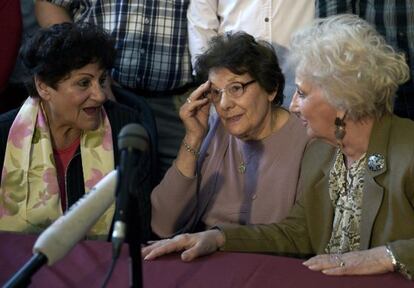Argentinean state celebrates first success in locating “stolen baby”
National Commission for Right to Identity finds 117th missing child from dictatorship


Until recently it was the Grandmothers of Plaza de Mayo who investigated reports of missing children of men and women who disappeared under Argentina’s last military dictatorship (1976-1983). But in 2014 the state’s National Commission for the Right to Identity (CONADI), which was created to help the Grandmothers in their search, started its own outreach program. CONADI provides assistance to people who suspect that they were born of parents who were victims of the regime. On Monday, the group celebrated its first case solved: it located the 117th missing grandchild.
Before, cases went straight to the courts. But now we want to provide a more humane form of rapprochement”
“CONADI receives reports and, once it has proof, before it goes to the courts, its outreach team goes to look for the person presumed to have been stolen in order to walk through it with them, assist them, and help them get a DNA test,” explains Manuel Gonçalves Granada, the group’s secretary. “Before, cases went straight to the courts. But now we want to provide a more humane form of rapprochement because it is a complicated and moving situation for the person. The group tries to give [them] the time and the considerations that the courts cannot, and tries to encourage them to take the step forward,” says Gonçalves, who was himself stolen from his parents. A court, on the other hand, has the power to order the subject to take a DNA test immediately, whether they are ready or not.
The outreach team located the 117th stolen child but it is yet to reveal her identity. Estela de Carlotto, president of Grandmothers of Plaza de Mayo, said the woman is the child of Walter Domínguez and Gladys Castro. Both belonged to the Communist Marxist Leninist Party, and were kidnapped in 1977 in Mendoza. The child was born in captivity in 1978 and given to an older couple to adopt.
The group is based in Buenos Aires but it travels to the provinces to assist people who have doubts about their provenance
María Assof de Domínguez and Angelina Catterino, the woman’s grandmothers, and her paternal uncle Osiris Domínguez, all joined Carlotto at the press conference to announce the news. Guido, Carlotto’s son and human rights secretary for Buenos Aires province, took the opportunity to criticize his party’s opponent in the upcoming presidential elections, Mauricio Macri: “They are saying that human rights are just robberies...Here we have some of those ‘robberies.’ Today we have the 117th ‘robbery’.”
The outreach team has studied 20 cases in its first year. Some are still pending but in others, the subjects have taken the DNA tests and given negative results. The group is based in Buenos Aires but it travels to the provinces to assist people who have doubts about their provenance. It also makes DNA testing available to those who are living abroad. The state sends all the necessary materials for the test in a suitcase under diplomatic protection and the test is done before an ambassador, consul, or the highest representative for Argentina in that country. Several people have taken the test in Spain, where the grandmothers’ outreach group in Madrid, Network for Identity, keeps up an active campaign calling for all those born between 1975 and 1980 who have doubts their identities to come forward.
More than 300 other cases remain unsolved.
English version by Dyane Jean Francois.
Tu suscripción se está usando en otro dispositivo
¿Quieres añadir otro usuario a tu suscripción?
Si continúas leyendo en este dispositivo, no se podrá leer en el otro.
FlechaTu suscripción se está usando en otro dispositivo y solo puedes acceder a EL PAÍS desde un dispositivo a la vez.
Si quieres compartir tu cuenta, cambia tu suscripción a la modalidad Premium, así podrás añadir otro usuario. Cada uno accederá con su propia cuenta de email, lo que os permitirá personalizar vuestra experiencia en EL PAÍS.
¿Tienes una suscripción de empresa? Accede aquí para contratar más cuentas.
En el caso de no saber quién está usando tu cuenta, te recomendamos cambiar tu contraseña aquí.
Si decides continuar compartiendo tu cuenta, este mensaje se mostrará en tu dispositivo y en el de la otra persona que está usando tu cuenta de forma indefinida, afectando a tu experiencia de lectura. Puedes consultar aquí los términos y condiciones de la suscripción digital.








































